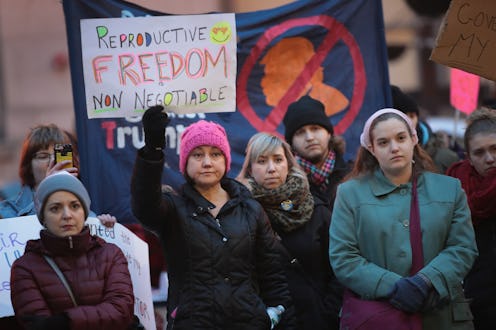News
Massachusetts Finally Wiped Out Old Anti-Abortion Laws — Here's Why That's A Big Deal

If you weren't aware that Massachusetts has had an abortion ban on the books for the last 173 years, you aren't alone — the law hasn't been enforced in ages. But with the threat of a potential Roe v. Wade appeal looming, some states are taking precautionary measures to get rid of any law that could be used to restrict women's reproductive freedom one day. To that end, Massachusetts has officially repealed its abortion ban.
Massachusetts Gov. Charlie Baker signed the Negating Archaic Statutes Targeting Young Women Act, also known as the "NASTY Woman Act," into law Friday, effectively repealing the state's long unenforced pre-Roe v. Wade ban on "illegally procuring a miscarriage." According to Time magazine, the NASTY Woman Act was overwhelmingly supported by most of the state legislature, which passed the bill Monday. Although women have been able to seek abortions in Massachusetts for years, lawmakers were reportedly worried that the right wasn't fully enshrined in state law.
"Today, we formally repeal a number of antiquated laws, some of which could lead to denying young women reproductive health care," Baker wrote in a brief statement tweeted Friday. "These laws do not represent Massachusetts' leadership on these issues or the shared goal of protecting women's access to health care."
Reproductive rights advocates also celebrated Massachusetts' move to officially wipe its pre-Roe v. Wade abortion ban from state law. "This is a massive victory for reproductive freedom, and ensures that no matter what happens to #RoevWade, abortion will always be legal in MA," NARAL Pro-Choice Massachusetts tweeted Friday. While the state's abortion ban had not been enforced for decades, the abortion rights group described it as one of Massachusetts' "harmful archaic laws."
Although the 1973 Supreme Court case Roe v. Wade made it legal for women across the nation to terminate their pregnancies, lawmakers across the U.S. fear conservative Supreme Court justices will attempt to overturn the landmark ruling should Brett Kavanaugh be confirmed. While there's still some question as to where Kavanaugh stands on abortion —, President Donald Trump has previously said he expected the case to be overturned "because I'm putting pro-life justices on the court."
If Roe v. Wade is overturned, states will revert to the abortion laws they previously had on the books. That could be troubling news for residents in the nine other states who still have pre-Roe v. Wade abortion bans on their books. What's more, the Guttmacher Institute reported earlier this month that "17 states have laws that could be used to restrict the legal status of abortion." Worst off are those living in any of the four states with "trigger laws," or measures "that automatically ban abortion if Roe were to be overturned."
But Massachusetts isn't the only state where lawmakers have prioritized efforts to officially take unenforced abortion restrictions off the books. According to TIME, legislators in New Mexico have already declared a repeal of the state's abortion ban to be a priority while New York Gov. Andrew Cuomo asked state lawmakers to reconvene for a special session aimed at codify abortion rights into law.
Morgan Brinlee contributed to this report.